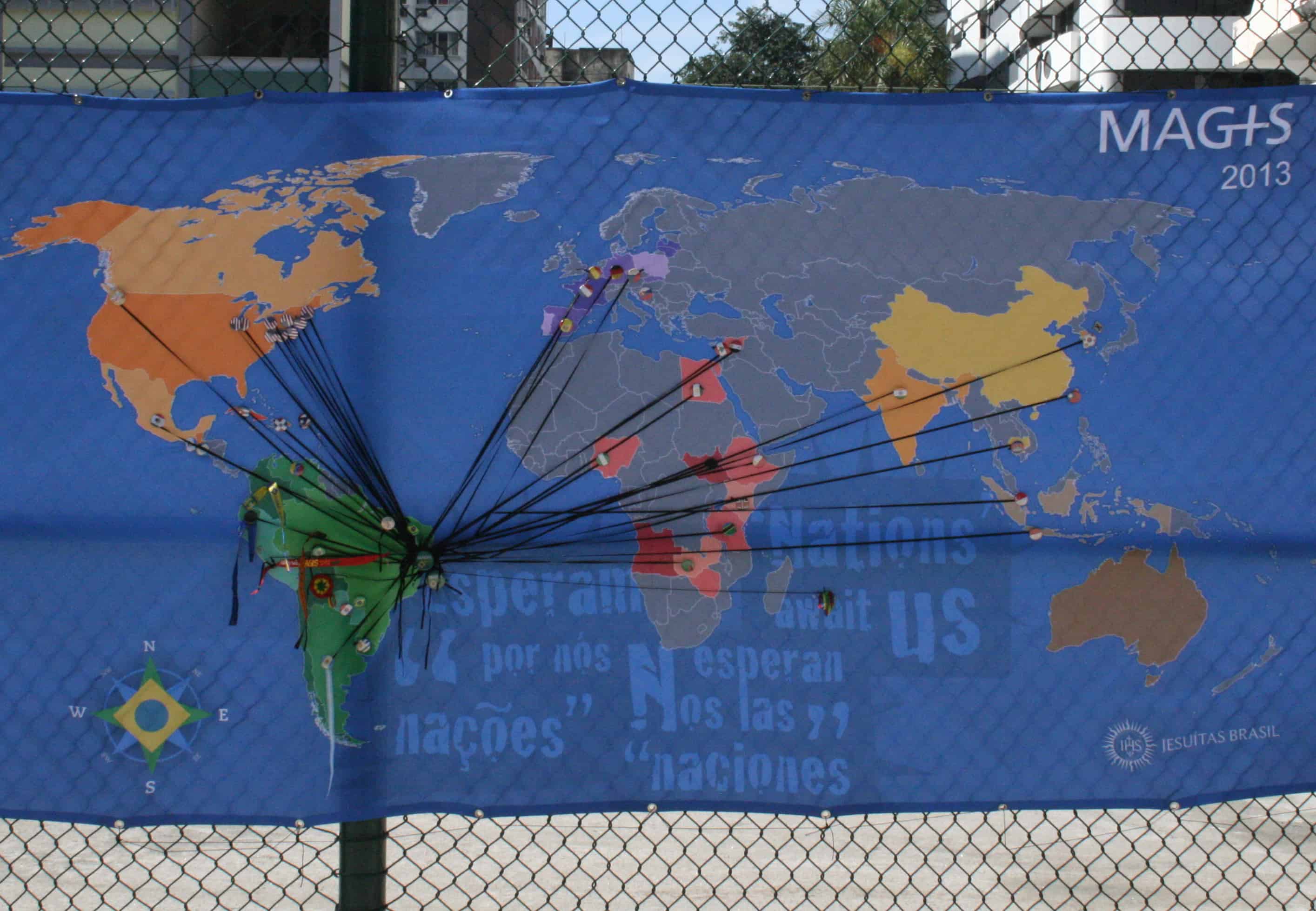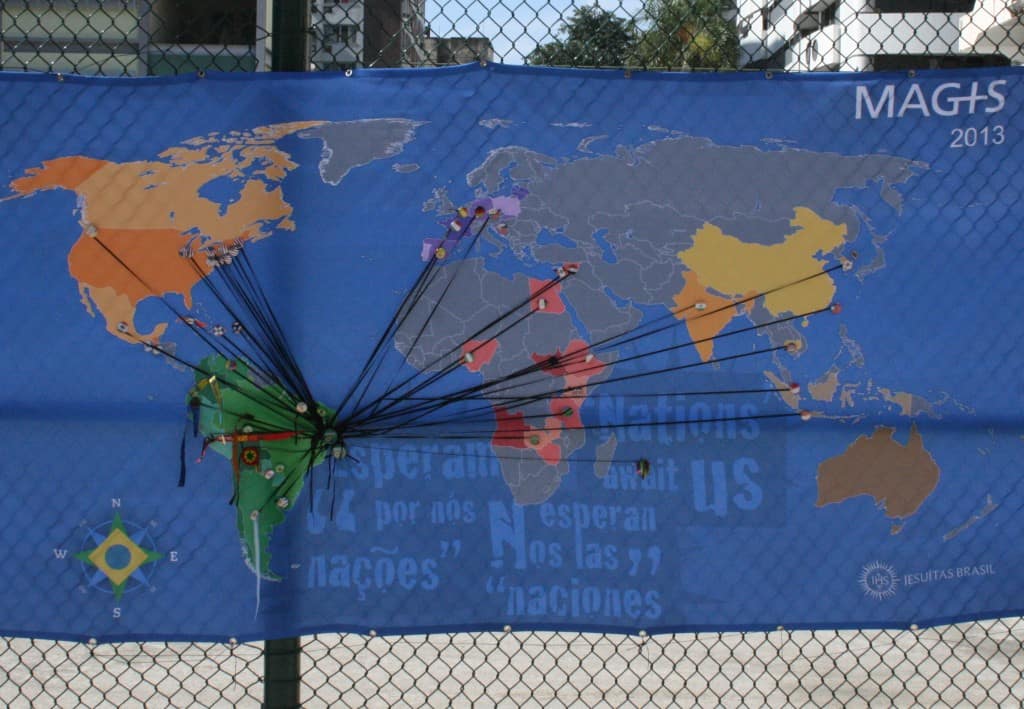
Esperam por nós “naçoes”— “Nations” await us
Hundreds of pilgrims filed off of buses from the airport in Salvador, Brazil after their long international flights. The theme for the MAGIS gathering was pasted all around the school: “Esperam por nós ‘naçoes’ — ‘Nations’ await us.” I still ponder the many possible meanings this esoteric phrase is intended to bear but at that moment I was the one awaiting the nations, documenting their arrival, and pointing them to the registration counter around the corner. Simple enough.
Each delegation was given a pin representing their national flag and was asked to place it on a large map near their point of origin; ribbons were tied from these points to a large “MAGIS’” pin on the coast of Brazil. As the day went on more and more ribbons representing more and more pilgrims connected more and more pins. It was a simple symbol of the gathering spirit and yet people couldn’t help taking pictures of it and with it late into the night.
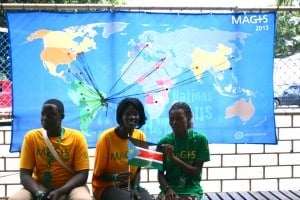
The Magis delegation from South Sudan
A small delegation from the newly independent Republic of South Sudan arrived to find the only pin available for them to use was the old Sudanese flag, a flag that now represents the country from which they recently won a hard-fought struggle for independence. They were noticeably dismayed and found a sympathetic Jesuit scholastic to help them explain their frustration to the event organizers. Apologies were offered and promises made to print a new pin with their young country’s colors on it. In the meantime they proudly placed a simple black pin on the map in place of the other one.
This moment, like many others here, was deceptively complex: in the process of tying themselves to this group of international pilgrims they struggled to identify themselves with appropriate distinction and sovereignty. It took many years of bloodshed and conflict to be liberated from the old map and here they were struggling to pin themselves to a new one.
***
Whenever I travel internationally with U.S. university students I notice their discomfort as they’re identified plainly (and, to be certain, accurately) by total strangers as “Americans.” Students often refuse or downplay their national identity in these contexts; they seem uncomfortable accepting generalizations that they routinely place on others. This is, I think, not so much a character flaw as it is a symptom of privilege—the freedom to presume that you’re immune to categorization. It’s kind of like when white males claim color-blindness or gender neutrality. Denying our identity is only possible, if at all, because of the privilege granted by the identity itself (as can be seen in nearly any stream of comments about the Trayvon Martin case). Of course we generally don’t refuse the benefits of privilege even if we pretend not to have it. Like the South Sudanese delegation mentioned above, we seek to preserve a distinctive identity — although not one so hard-won — whether or not we’re willing to actually pin it on a map.
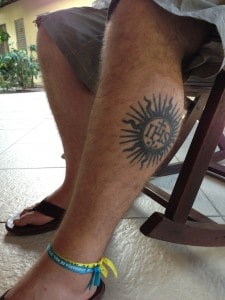
“… like the needle in my flesh and the ink under my skin …”
This desire for personal and communal identity is often deeper than we first realize. Before I entered the Society of Jesus I was a Jesuit Volunteer for two years in Belize. This was enough of a commitment for me to put a tattoo on my leg of the IHS sunburst, the symbol found around the world on Jesuit churches and other works. I had no idea what I was doing, but I knew enough to know that I wanted to mark myself with that sign. I was unaware of the path ahead that would eventually lead me to join the Jesuits. I knew only this: I wanted a permanent reminder of my orientation … my purpose…my values…my hopes. At that time these included the values of the Jesuit Volunteers: Simplicity, Justice, Community, and Spirituality. They’ve since become poverty, chastity, and obedience; faith and justice; community and ministry; kinship and love. Like pins in a map, like the needle in my flesh and the ink under my skin, I wanted to mark myself with the things that give my life meaning, that remind me who I am, of what I believe and hope to become.
***
This gathering of young people from Jesuit schools and parishes around the world is a place of incredible diversity—a diversity that hopes, in faith, to be mysteriously preserved and united. A fellow Jesuit noted that there are few gatherings as international as this one that aren’t driven by athletic competition or diplomatic negotiation, but instead by celebration of a common identity. The opening ceremonies at the end of the first day were more of a dance party than a formal welcome, like some sort of victory parade without anything having been won. This was just the beginning and the flags waving above the dancing crowd were those of dozens of countries. The energy was festive and yet the only thing to celebrate was the arrival, the gathering, and the first awkward encounters of pilgrims on the way.
Throughout the afternoon a few women with an old sewing machine quilted together flags brought by pilgrims from around the world. At the end of the night this massive banner was raised above the gathered crowd. At some point one of the seams gave way and some flags came loose, but this didn’t stop the joy or enthusiasm of the crowd below. Nations may be awaiting us — whatever that means — but for a few hours under that banner the nations didn’t await anything; they rejoiced. Pop songs and club beats from around the globe pounded the air. Those with no flag to wave just danced. Those who couldn’t dance just jumped up and down. And those too tired to jump? Well, they simply stood in the back, somewhere between fatigue and awe, wide-eyed and breathless, moved by the pulse of something deep inside their chest.
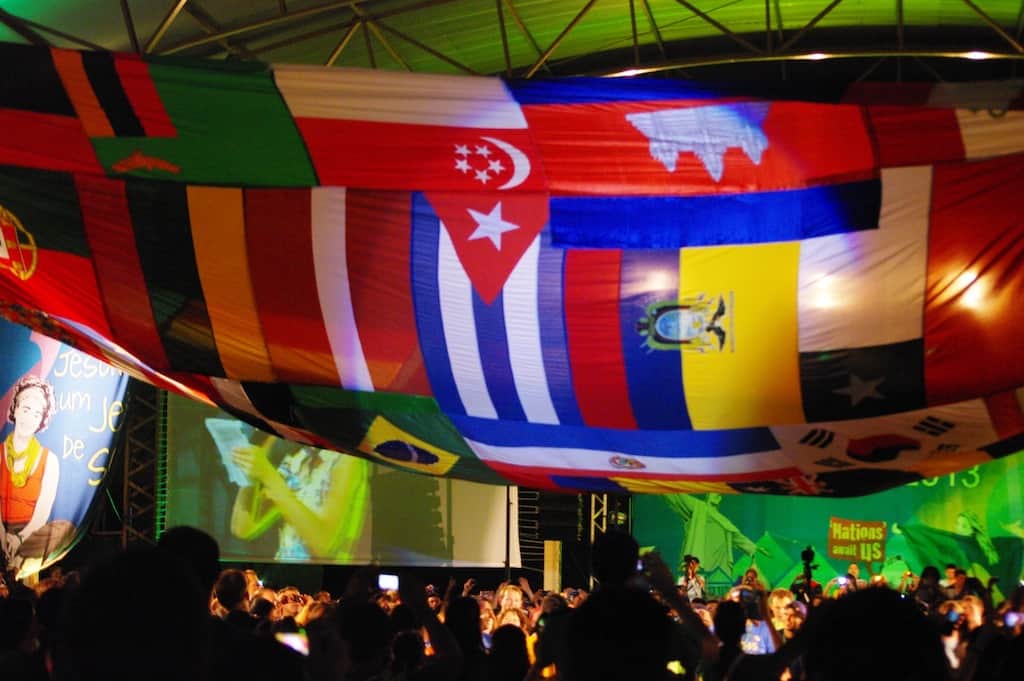
Magis Flag Banner

